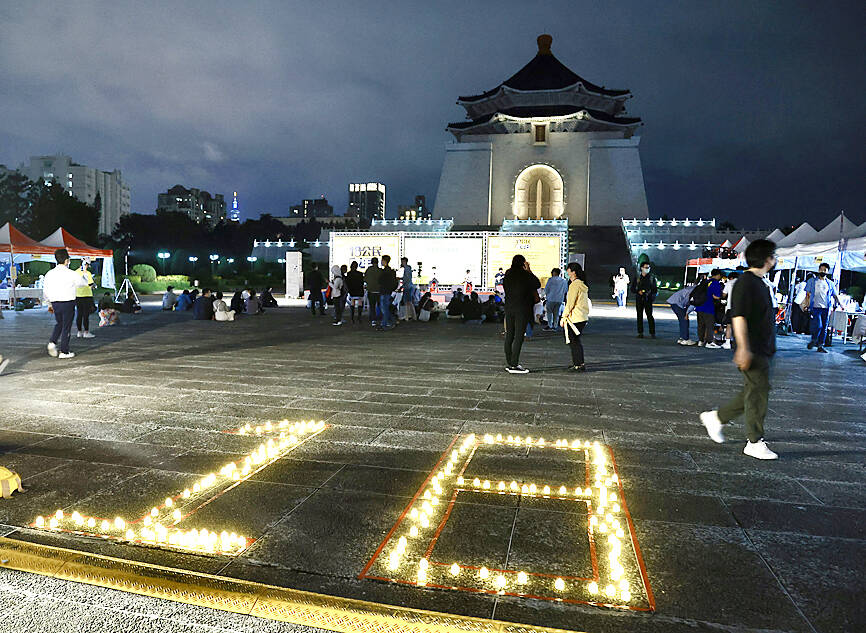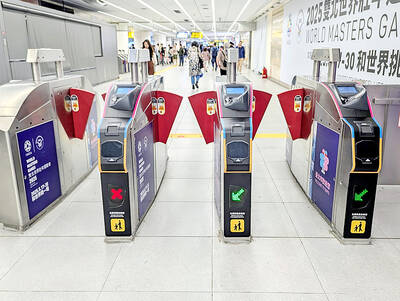Non-governmental organizations and student groups expressed disappointment on Saturday evening at the failure of a referendum that would have lowered the voting age in Taiwan from 20 to 18, and they hinted at other steps to address the issue.
The referendum, which asked voters to approve a proposed constitutional amendment granting voting rights to citizens aged 18 and over along with the right to run for office, was held in conjunction with local government elections on Saturday.
The referendum fell short of the threshold — nearly 9.62 million “yes” votes — needed to pass, as only 5.65 million voters backed the proposed revision against 5.02 million voters opposing it, data from the Central Election Commission (CEC) showed.

Photo: CNA
Voting in the referendum was about 59 percent, slightly less than the 60 percent for the city and county commissioner elections, although 6 percent of the votes cast were invalid.
With passage requiring 50 percent of all eligible voters to support the initiative, about 90 percent of the 10.66 million valid votes cast would have had to be “yes” votes for the constitutional amendment to go through.
The referendum result was “regrettable,” the Taiwan Alliance for Advancement of Youth Rights and Welfare (TAAYRW), the Taiwan Youth Association for Democracy (TYAD) and other groups said.
“This is not the result we looked forward to seeing,” TAAYRW secretary-general Lin Yueh-chin (林月琴) said.
To amend the Constitution, legislators must first pass a proposed amendment with at least three-quarters of all lawmakers present and a minimum of three-quarters of those present supporting the measure.
The proposed amendment must then be endorsed in a national referendum, with half of the nation’s eligible voters supporting it for it to pass.
These rules were enshrined in the Additional Articles of the Constitution of the Republic of China in 2005, when Taiwan last made a constitutional revision.
TYAD managing director Alvin Chang (張育萌) said he was proud that the first referendum on proposed constitutional amendments garnered more than 5 million “yes” votes.
Chang expressed gratitude to many mayoral and city councilor candidates who openly championed the passage of the referendum during their election campaigns.
However, it remains problematic that people turning 18 next year would face citizen-related obligations, such as paying taxes, as stipulated in the Civil Code, without being given the right to vote, Chang said.
Starting next year, the age of majority in the Civil Code is to be 18, in accordance with the Criminal Code based on an amendment passed in December 2020.
The TYAD in a statement blamed the CEC for not promoting the referendum enough, as about half of all voters were unaware that it would be held on Saturday, it said, citing a survey conducted last month.
There were reported cases in which polling station staff did not automatically provide referendum ballots to voters, as they did with election ballots, until they were asked to do so.
Those staff might have been negligent, the TYAD said, and it called on the agency to look into the reported cases.
Meanwhile, the Democratic Progressive Party (DPP) and the Chinese Nationalist Party (KMT) said they found the referendum result regrettable.
The DPP said its candidates had seized every opportunity to urge supporters to back the proposed amendment in public events over the past few months.
The KMT said it respects the decision of voters and that its support for the proposed measure to lower the voting age remains unchanged.

A magnitude 6.4 earthquake struck off the coast of Hualien County in eastern Taiwan at 7pm yesterday, the Central Weather Administration (CWA) said. The epicenter of the temblor was at sea, about 69.9km south of Hualien County Hall, at a depth of 30.9km, it said. There were no immediate reports of damage resulting from the quake. The earthquake’s intensity, which gauges the actual effect of a temblor, was highest in Taitung County’s Changbin Township (長濱), where it measured 5 on Taiwan’s seven-tier intensity scale. The quake also measured an intensity of 4 in Hualien, Nantou, Chiayi, Yunlin, Changhua and Miaoli counties, as well as

Credit departments of farmers’ and fishers’ associations blocked a total of more than NT$180 million (US$6.01 million) from being lost to scams last year, National Police Agency (NPA) data showed. The Agricultural Finance Agency (AFA) said last week that staff of farmers’ and fishers’ associations’ credit departments are required to implement fraud prevention measures when they serve clients at the counter. They would ask clients about personal financial management activities whenever they suspect there might be a fraud situation, and would immediately report the incident to local authorities, which would send police officers to the site to help, it said. NPA data showed

ENERGY RESILIENCE: Although Alaska is open for investments, Taiwan is sourcing its gas from the Middle East, and the sea routes carry risks, Ho Cheng-hui said US government officials’ high-profile reception of a Taiwanese representative at the Alaska Sustainable Energy Conference indicated the emergence of an Indo-Pacific energy resilience alliance, an academic said. Presidential Office Secretary-General Pan Men-an (潘孟安) attended the conference in Alaska on Thursday last week at the invitation of the US government. Pan visited oil and gas facilities with senior US officials, including US Secretary of the Interior Doug Burgum, US Secretary of Energy Chris Wright, Alaska Governor Mike Dunleavy and US Senator Daniel Sullivan. Pan attending the conference on behalf of President William Lai (賴清德) shows a significant elevation in diplomatic representation,

The Taipei MRT is to begin accepting mobile payment services in the fall, Taipei Rapid Transit Corp said on Saturday. When the company finishes the installation of new payment units at ticketing gates in October, MRT passengers can use credit cards, Apple Pay, Google Pay and Samsung Pay, the operator said. In addition, the MRT would also provide QR payment codes — which would be compatible with Line Pay, Jkopay, iPass Money, PXPay Plus, EasyWallet, iCash Pay, Taiwan Pay and Taishin Pay — to access the railway system. Currently, passengers can access the Taipei MRT by buying a single-journey token or using EasyCard,